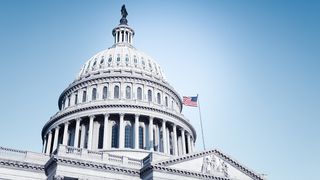The US-Australia refugee deal may die once President Donald Trump has studied the 'dumb deal' and considered whether it will get him 'killed' politically. But if domestic political calculations are the primary factor shaping Trump’s upcoming decision, it seems likely the deal will remain intact.
In the week since the explosive Washington Post story catapulted details of the Obama-era refugee deal into the consciousness of Congress, just two members of Congress have made negative comments about the deal. Meanwhile, at least 20 lawmakers have implicitly criticised Trump’s approach to Prime Minister Malcolm Turnbull by expressing resolute support for the US-Australia alliance. This reaction from Capitol Hill suggests that the Trump Administration could allow the deal proceed without fear of a political backlash.
Congressional opposition to the deal has been limited, despite the Washington Post story making global headlines. Texas Representative Louie Gohmert criticised the deal in a partisan manner during a long speech in the House of Representatives, accusing former President Obama of accepting 'dangerous refugees' who 'yearn to destroy America'. Although Gohmert railed against Obama’s decision to agree to the deal, he did not address whether or not President Trump should allow it to proceed.
Similarly, Senator Chuck Grassley this week wrote to Secretary of State Rex Tillerson asking for the details of a 'secret agreement' to be made public. Grassley had voiced more strident opposition in a letter last November, in which he raised specific concerns that many of the refugees on Manus Island and Nauru were from 'countries of national security concern' (including Pakistan, Afghanistan, Somalia and Iraq) as well as countries (Iran and Sudan) officially designated by the State Department to be State Sponsors of Terrorism.
The absence of broader or harsher congressional criticism is noteworthy. Both Gohmert and Grassley raised their objections without calling for President Trump to scrap the deal. Previous critics of the deal, Bob Goodlatte and Brian Babin, have stayed quiet in the last week. Regardless of the reason for such restraint, the muted response indicates that Republicans would give the president latitude should he honour the Obama-era agreement.
Moreover, Republican Senator Lindsey Graham told CNN he could see the deal proceeding if refugees on Manus Island and Nauru are 'well vetted'.
While congressional opposition to the deal has been limited, a powerful bipartisan constellation of representatives and senators have rushed to affirm the value and depth the US relationship with Australia. At least five senators – Jack Reed, John McCain, Bob Corker, Cory Gardner and Tammy Duckworth – spoke to Australia's US Ambassador Joe Hockey during the last week.
In the Senate and House of Representatives, members have introduced formal resolutions that underscore Congress’ 'strong commitment to the United States-Australia alliance relationship', and state that Australia is a 'partner crucial to the preservation of United States national interests'. The Senate resolution was introduced with bipartisan support from 10 senators, including the top Democrat on the Senate Committee on Foreign Relations, Ben Cardin, and former Republican presidential candidate Marco Rubio.
A cast of senior Republicans and Democrats in Congress have voiced unreserved praise for Australia. Among them was Paul Ryan, the Republican speaker of the House of Representatives, who said Australia is a 'very central ally… and they will continue to be' in his weekly press briefing. The chair of the Senate Armed Services Committee, John McCain, also issued a statement labelling Australia 'one of America’s oldest friends and staunchest allies' and offered his 'unwavering support' for the alliance. Congressman Steny Hoyer, the number two Democrat in the House, and Dianne Feinstein, a senior Democrat who has served California in the Senate for over 20 years, were similarly vocal in their support for Australia and the alliance.
Yet the most effusive comments came from Tennessee Republican Lamar Alexander, who dedicated an entire speech on the Senate floor to Australia. Alexander evidently has a deep bond with this country: he spent six months here with his wife and four children in the 1980s and subsequently wrote a book about his family’s Australian 'odyssey'. In his speech, Alexander spoke about all things from defence and economic relations to crocodiles.
Such congressional goodwill towards Australia does not guarantee that President Trump will honour the refugee deal. However, Trump’s inner circle cannot have missed such broad-ranging, bipartisan opposition to the President’s approach with the Australian prime minister. If Trump does scrap the deal he could face criticism for humiliating Australia, whose importance as a US ally has just been reaffirmed at the most senior levels of Congress.






